Groundbreaking Workshop on AI and Technology-Facilitated Gender-Based Violence at AWiM24
Trending
Friday May 30, 2025
Trending
“I am currently on medication to end the infection I got because of FGM. I treat it until I get fed up because it is hard for me to get rid of even for a month. The infection vanishes and comes back within a week’’
Binta Ceesay, a survivor of Female Genital Mutilation (FGM) in Gambia, narrates her sad experience of being circumcised without understanding the violation of her health rights. Having never attended school, Ceesay remained unaware of her fundamental human rights, including those related to sexual and reproductive health.
“My unending infection traumatises me and I feel scared to have kids due to the past experiences I had when giving birth to my first child,” Ceesay explained.
According to a recent survey, 73% of women in The Gambia have undergone FGM with 65% of those under the age of five. The practice is usually conducted by older women in society.
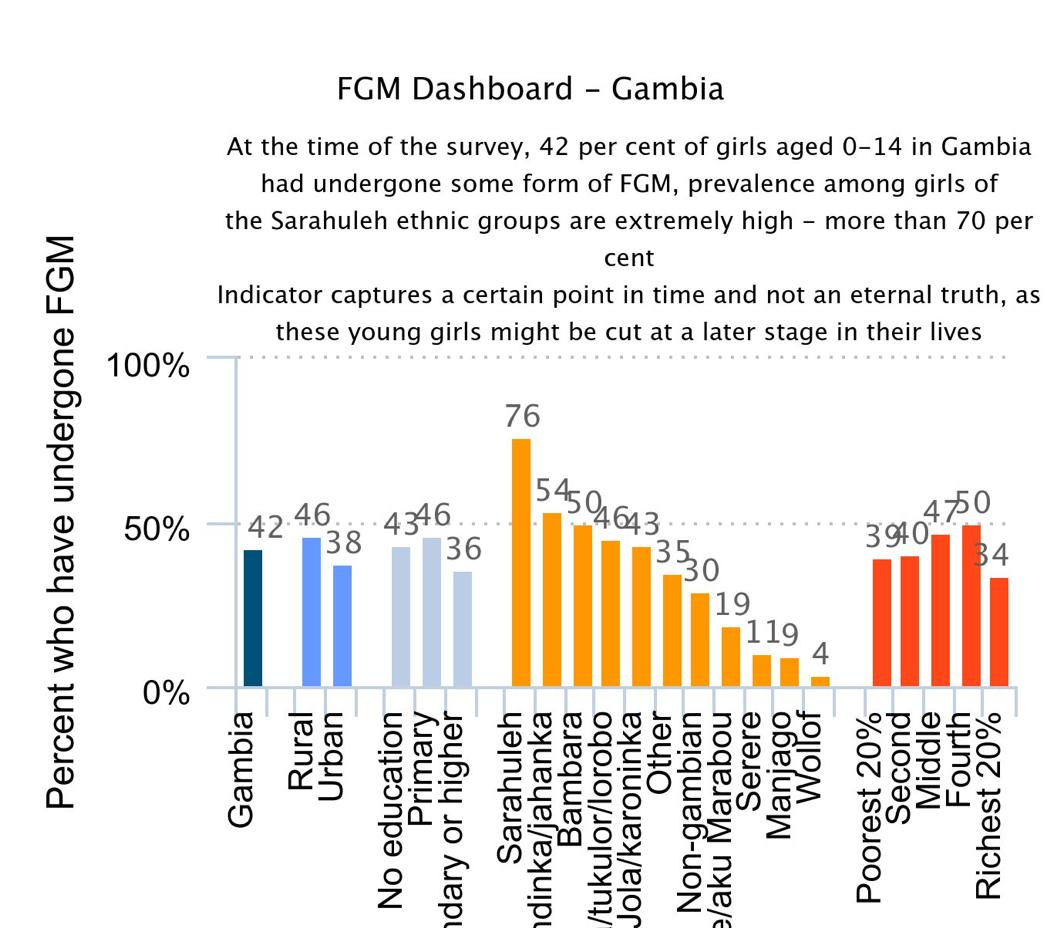
Photo Credit: Demographic and Health Surveys 2013
The Chairman of The Gambia National Assembly Human Rights Committee, Madi Ceesay, said Children are subjected to this practice without their consent, noting that not only girls are subjected to this practice but even some boys are circumcised at a very early age without their consent which is a human right violation that should be a concern.
“Sensitisation is an onus of the government to make sure that the laws are known to the public. You cannot promulgate laws and keep them to yourself without the public knowing when the rules are there for both the public and the government. Therefore it is an onus for the government to make sure that these laws that are legislated are popularized for the public to know. This is why we have the Civic Education Unit of The Gambia government. I don’t think the sensitization is really at a satisfactory level a lot needs to be done as far as the popularization of these legislations is concerned.
The sexual reproductive violations of women and girls are one of the most vulnerable rights violations for women as most of their abuses are based on their sexual reproductive rights which need to be addressed thoroughly.
Virtual Knowledge Centre Sources of International human rights law on female
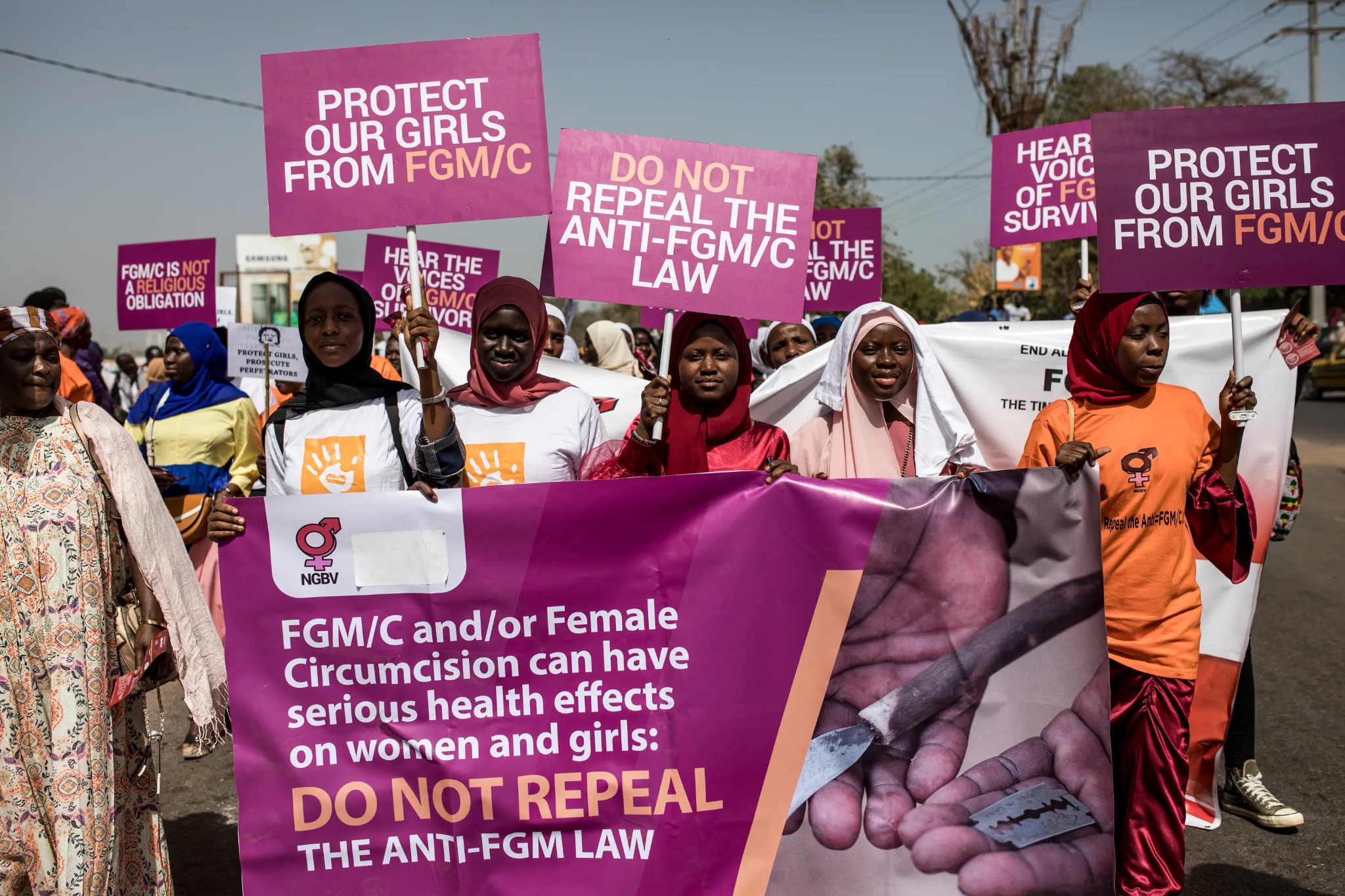
Protesters against female genital mutilation (FGM) demonstrate outside the National Assembly in Banjul, Gambia, on March 18, 2024.
Photo Credit: © 2024 Muhamadou Bittaye/AFP via Getty Images
FGM is a violation of the human rights of women and girls as recognized in numerous international and regional human rights instruments.
Human Rights Lawyer, Anna Njie, said FGM-related health and psychological issues can lead to school absenteeism and hinder educational performance, conflicting with The Education Act 2004 and Article 10 of CEDAW, which promotes equal access to education for all girls.

Human Rights Lawyer, Anna Njie
“The trauma and health complications from FGM can impact a girl’s ability to concentrate and succeed in school, thereby impeding the fulfillment of educational rights as outlined in national and international laws,” she stated.
According to Anna, FGM is addressed under The Gambia’s 1997 Constitution, the Women’s Act 2010 (as amended in 2015), and international conventions such as the Maputo Protocol (Article 5) and CEDAW (Article 2), which criminalize harmful practices and ensure protection against violations.
She further stated that section 33 of The Gambia’s Constitution, and Articles 1 and 2 of CEDAW mandate equality and non-discrimination, directly opposing practices like FGM.
“The prohibition of degrading treatment is enshrined in Section 21 of The Gambia’s Constitution and Article 4 of the Maputo Protocol, which aligns with the global standard for respecting human dignity. The Women’s Act 2010, along with the Maputo Protocol (Article 5) and CEDAW, provide legal frameworks for accountability and justice for victims of FGM.”
Emphasising the measures that should be put in place to ensure that women and girls are fully protected, especially school-going girls, the Human rights lawyer said Women’s Act 2010 and related laws rigorously, aligning with international obligations under the Maputo Protocol (Article 5) and CEDAW (Article 2) to protect against harmful practices should be enforced.
Njie is calling on the government to develop and implement educational campaigns to raise awareness about FGM and its legal consequences, in line with the Gender and Women’s Empowerment Policy and international standards. She believes that providing comprehensive support services for FGM survivors, including healthcare and psychological support, as advocated by the Public Health Act and Article 14 of the Maputo Protocol, will make a lot of difference.
“Integrate FGM prevention and response strategies into school policies and curricula, ensuring safe environments for affected students and adhering to the principles outlined in CEDAW (Article 10). Equip law enforcement and judicial personnel with training to handle FGM cases effectively, respecting legal standards set by national laws and international conventions,” she noted
She also remarked that the health complications arising from FGM are inconsistent with The Public Health Act 1990 and Article 14 of the Maputo Protocol, which mandates the protection of women’s health and access to healthcare services.
FGM inflicts severe pain and harm, violating The Gambia’s 1997 Constitution (Section 21) and the African Charter on Human and People’s Rights( Maputo Protocol, Article 5), which both safeguard bodily integrity and prohibit harmful practices.
“Right to Freedom from Torture and Cruel, Inhuman, or Degrading Treatment FGM is deemed as cruel and inhumane, violating Section 19 of The Gambia’s Constitution and Article 4 of the Maputo Protocol, which prohibits torture and inhumane treatment.”
Another human rights lawyer Hassan Martin has said the practice should be a choice for families, saying those who will be engaging in the practice shall owe a duty of care and be ready to take responsibility where the practice has gone wrong. “There should be the need to educate on the issue, moreover to do a periodic review in the society, every 5 years, to evaluate the health implications on the person concerned.”
According to the BioMed Control reproductive health report, Two hundred million girls and women in the world are estimated to have undergone female genital mutilation (FGM), and another 15 million girls are at risk of experiencing it by 2020 in high prevalence countries.
According to the 2019-2020 Gambia Demographic and Health Survey (GDHS),nearly 5 in 10 girls age 0-14 in The Gambia have undergone FGM and cutting. Yet, these data do not tell the full story, as girls age 0-14 who had not undergone FGM or cutting at the time of the survey are still at risk of being cut in the future.
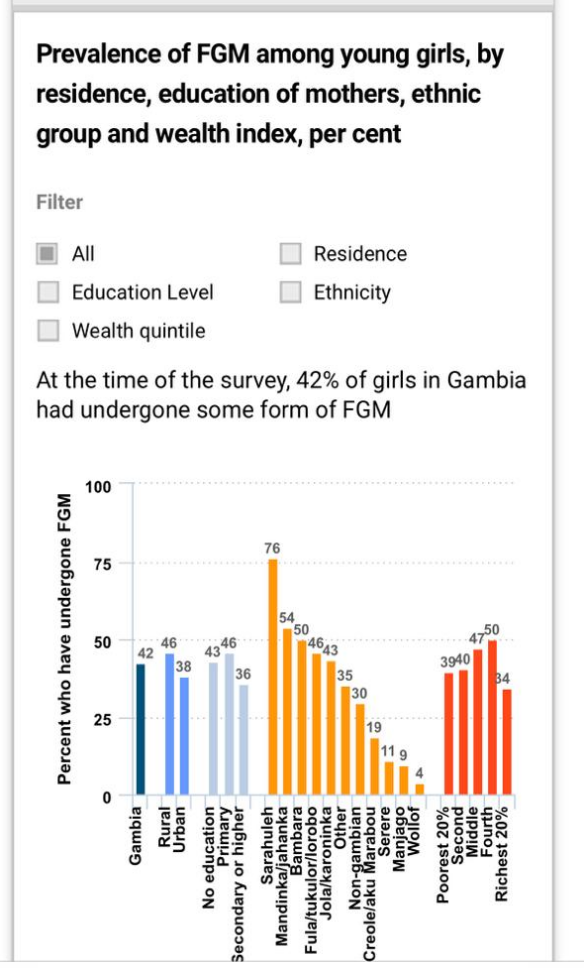
Photo Credit: UNFPA.ORG
Despite decades of concerted efforts to eradicate the practice, and the increased need for clear guidance on the treatment and care of women who have undergone FGM, present efforts have not yet been able to effectively curb the number of women and girls subjected to this practice nor are they sufficient to respond to health needs of millions of women and girls living with FGM.
Types of FGM And the Procedures
A report on Female Genital Mutilation (FGM) or Female Genital Cutting (FGC) in Gambia sponsored by the US government, and released from January 20 2001 to January 20, 2009, showed that the older women and excisors are the major force behind maintaining the practice.The enticement is usually a big party, where festive cooking and new clothes are commonly used as incentives for a girl to undergo the procedure.
In some cases, older women have been known to pursue a reluctant young woman and force her to undergo the procedure. It is difficult for a young woman to resist in the face of powerful extended family members should she decide not to. Occasionally the procedure is performed without the parents’ consent.
There are different types of FGM in Gambia according to the report:
Type I: This is the removal of the clitoral hood with or without removal of all or part of the clitoris.
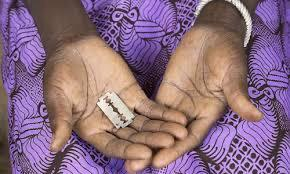
Photo Credit: BBC
Type II: This is the removal of the clitoris together with part or all of the labia minora (the inner vaginal lips).
Type III: This is the removal of part or all of the external genitalia including the clitoris, labia minora and labia majora and stitching or narrowing of the vaginal opening, leaving a very small opening, about the size of a matchstick, to allow for the flow of urine and menstrual blood. Thorns are used to stitch the vaginal opening. The girl or woman’s legs are then bound together from the hip to the ankle so she remains immobile for approximately 40 days to allow for the formation of scar tissue.It is estimated that about seven percent of girls undergo some form of this severe and dangerous procedure.
Type IV: This is similar to Type III, but described as “sealing” in Gambia. Sealing involves the removal of the clitoris and the labia minora, followed by sealing the vaginal opening with clots of blood or herbal powder leaving only a small opening, about the diameter of a matchstick, for urination and menstruation. The legs are forced to stay tightly together during the period of convalescence (about 40 days) allowing the raw vaginal tissue to fuse.
A woman of the blacksmith’s class who is believed to be gifted with knowledge of the occult traditionally carries out these procedures, using various instruments. Fingernails have been used to pluck out the clitoris of babies in some areas of the country. The procedure is often performed by a village excisor without the use of anesthesia.
Ending FGM in the Gambia
On July 15, 2024, Gambian lawmakers voted to uphold a 2015 ban on female genital mutilation (FGM). The lawmakers rejected a 2024 bill seeking to overturn the ban on FGM . While some anti FGM lawmakers were strongly against overturning the ban, others in support of FGM said the ban violates rights of Citizens to practice their religion and culture
The Women’s (Amendment) Bill 2024, which had sought to decriminalise the practice of female circumcision, had passed a second reading in March with only five out of 53 lawmakers voting against it, raising concerns among rights groups that the Gambia would become the first country to reverse a ban on the practice. Fortunately, the National Assembly Speaker Fabakary Tombong Jatta had to stop the bill from moving forward to the final reading.
Reacting to the rejection of the bill by Gambia’s parliament, Samira Daoud, Amnesty International Regional Director for West and Central Africa, said,“We welcome with great relief the rejection of the bill aimed at reversing the ban on FGM in Gambia. In 2015, the adoption of the Women’s (Amendment) Act, which criminalizes and sets out punishments for performing, aiding and abetting the practice of FGM, represented a significant milestone in the country’s efforts to safeguard girls’ and women’s rights. It was essential that this progress was protected.
International efforts to address FGM have thus far focused primarily on preventing the practice, with less attention to treating associated health complications, caring for survivors, and engaging healthcare providers as key stakeholders.
Recognizing this imperative, WHO developed guidelines on the management of health complications of FGM. According to the WHO: “In this paper, based on foundational research for the development of WHO’s guidelines, we situate the practice of FGM as a rights violation in the context of international and national policy and efforts and explore the role of health providers in upholding health-related human rights of women at girls who are survivors, or who are at risk’’. Findings on this research are based on a literature review of relevant international human rights treaties and UN Treaty Monitoring Bodies.
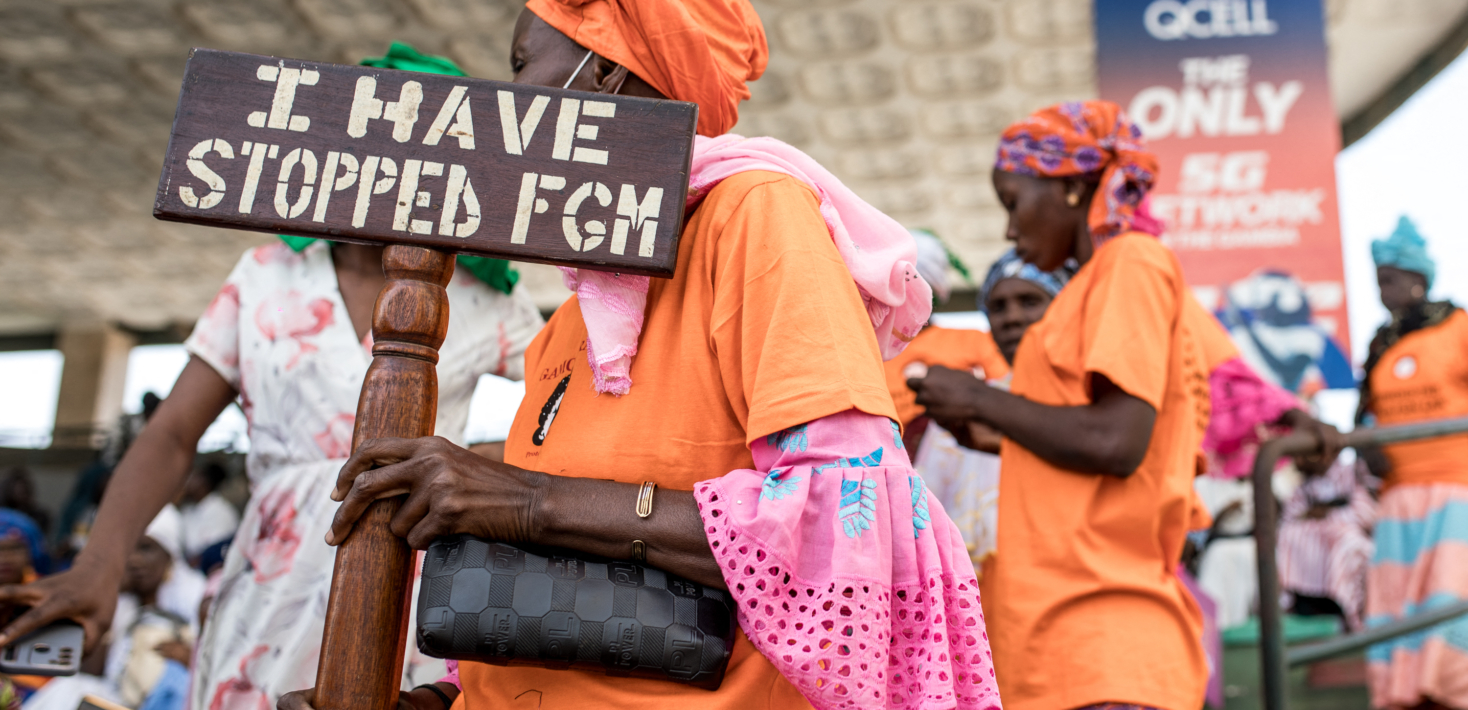
Photo Credit: © 2024 Muhamadou Bittaye/AFP via Getty Images
Another survivor cum Women and Girls Right Activist, Fatima Jarju, said at a younger age she did not know what human rights violations are but she knew it was gender based violence because of how it was done.
“I faced so many consequences from trauma to pain. So, to me, it wasn’t a peaceful practice. Anything that makes me feel pain since when I was a child, I consider it as a bad thing,” she said.
Ms. Fatou began to understand basic human rights and the impact of FGM during her high school years as that was the time she learned that FGM aims to suppress women’s sexual desires which makes it a human rights violation.
“This was the time I realized that my rights had been violated as my clitoris was cut for my sexual desires to reduce and for me not to have a full clitoris. Every woman and girl has the right to have their full reproductive health without having their reproductive organs operated on based on medical advice, and every woman has the right to enjoy sex FGM is done for women not to enjoy sex like men which is a big rights violation,” she explained.
“African Women in Media’s Gender Stories Editorial Fellowship, supported by Fojo Media Institute”
We’re not gonna spam. We’ll try at least.

Copyright 2020. African Women In Media
Copyright 2020. African Women In Media
Recent Comments